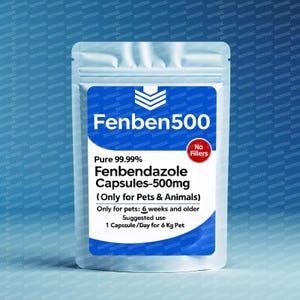Exploring the Mechanisms Behind Fenbendazole and Its Effect On Pet Health
Fenbendazole is a widely used anthelmintic understood for its effectiveness versus various parasites. Its key system involves the inhibition of microtubule development, which disrupts important processes in these pathogens. Beyond its antiparasitic properties, fenbendazole also shows up to enhance immune actions and possesses anti-inflammatory benefits. Recognizing these diverse results might expose new applications for pet health and wellness. However, concerns stay concerning its full possibility and safety and security account.
The Pharmacokinetics of Fenbendazole
The pharmacokinetics of fenbendazole, a widely utilized anthelmintic in vet medication, involves the research study of its absorption, distribution, metabolic rate, and discharging within pet systems. After administration, fenbendazole is rapidly soaked up from the intestinal tract, with peak plasma concentrations taking place within hours. Its distribution is influenced by aspects such as tissue binding and lipid solubility, allowing it to permeate various tissues properly. The drug undertakes considerable metabolic process mainly in the liver, where it is exchanged active and non-active metabolites. These metabolites contribute in the medicine's overall efficacy and safety profile. Excretion happens mainly through feces, with a smaller proportion eliminated through urine. The half-life of fenbendazole varies amongst species, which affects application routines. Understanding these pharmacokinetic properties is necessary for optimizing its therapeutic use and making sure efficient parasite control in veterinary techniques.
Systems of Activity Versus Bloodsuckers
Fenbendazole applies its antiparasitic results primarily via the restraint of microtubule development in parasites. This interruption affects their architectural honesty and cellular features, leading to impaired basal metabolism. Because of this, the medicine effectively compromises the survival and recreation of different parasitical organisms.
Restraint of Microtubule Development
Inhibition of microtubule formation represents a crucial mechanism whereby specific anthelmintic agents, consisting of fenbendazole, apply their impacts on parasites. Fenbendazole binds to tubulin, a healthy protein that develops microtubules, disrupting the polymerization process needed for microtubule assembly. This interruption impairs vital cellular features, consisting of mitosis, intracellular transportation, and architectural stability. As microtubules play a critical function in maintaining the form and function of parasitical cells, their inhibition results in cell cycle apprehension and ultimate fatality of the parasite. This device is especially efficient versus nematodes, as their dependence on microtubules for wheelchair and nutrient absorption makes them prone to fenbendazole. Consequently, the inhibition of microtubule formation is a critical aspect of fenbendazole's healing effectiveness in veterinary medication.
Disruption of Basal Metabolism
Interrupting power metabolic rate is one more crucial system by which fenbendazole targets parasitical microorganisms. This anthelmintic changes the energy manufacturing pathways within bloodsuckers, mainly influencing their capability to produce adenosine triphosphate (ATP) By hindering sugar uptake and interfering with mitochondrial feature, fenbendazole limits the energy sources essential for the survival and recreation of these organisms. Because of this, bloodsuckers end up being progressively vulnerable to ecological stress and anxieties and immune feedbacks. Furthermore, the disturbance in power metabolic process not only affects the parasites straight but also lowers their ability to assimilate nutrients, even more harming their development. Overall, the interruption of power metabolic process stands for an essential facet of fenbendazole's effectiveness versus different parasitical infections, adding greatly to enhanced animal wellness outcomes
Possible Negative Effects and Safety Profile
The prospective side impacts and safety and security profile of fenbendazole warrant mindful factor to consider, specifically in veterinary applications. While normally considered safe, some animals might experience negative responses, see here including stomach disturbances such as throwing up and looseness of the bowels. Additionally, neurological signs and symptoms, although unusual, have actually been reported in sensitive individuals, highlighting the demand for surveillance throughout treatment.

Fenbendazole's safety and security in various varieties, including canines and pet cats, has been recorded, but dose and duration of therapy have to be thoroughly handled to minimize risks. Expectant or lactating pets may likewise need special attention, as the impacts on creating unborn children or nursing children are not fully recognized.
Normal veterinary appointments can aid mitigate prospective negative effects and assure the drug is provided suitably. Consequently, while fenbendazole is a reliable anthelmintic agent, vigilance regarding its adverse effects is crucial for maintaining animal health and wellness.

Fenbendazole's Impact on Immune Feature
Fenbendazole has actually been kept in mind for its possible to regulate body immune system responses in animals. Its anti-inflammatory residential or commercial properties might add to enhanced immune function, giving a double advantage in handling health (fenbendazole capsules). Understanding these effects is necessary for assessing fenbendazole's function in vet medicine
Immune System Inflection

Anti-inflammatory Qualities
Anti-inflammatory results stand for a considerable aspect of fenbendazole's impact on immune feature. Study indicates that fenbendazole might lower the manufacturing of pro-inflammatory cytokines, which are pivotal in moderating inflammatory feedbacks. By modulating these cytokines, fenbendazole can possibly ease inflammation-related problems in animals. This anti-inflammatory action not only help in managing signs connected with numerous diseases but likewise improves overall body immune system effectiveness. Furthermore, its ability to promote a balanced immune reaction helps prevent extreme inflammatory damages, which can result in persistent health and wellness concerns. Fenbendazole's function in inflammation administration underscores its value in veterinary medicine, giving a twin benefit of antiparasitic activity and immune system support for pet wellness.
Applications Beyond Traditional Parasitic Infections
While mainly acknowledged for its efficiency against numerous parasitic infections, fenbendazole has actually amassed attention for potential applications beyond this typical extent. Current researches suggest that fenbendazole might have helpful results on mobile health and immune action, making it an intriguing prospect for managing various other health conditions in pets. For circumstances, its reported anti-inflammatory residential properties may offer alleviation for animals experiencing chronic inflammatory illness. Additionally, some research suggests that fenbendazole might play a duty in check over here supporting the general wellness of animals by boosting nutrition absorption and stomach wellness. Moreover, its prospective as a complement treatment in cancer treatment has actually triggered passion, as initial findings suggest it might inhibit growth cell development in certain contexts. These varied applications highlight fenbendazole's convenience, encouraging further expedition right into its diverse benefits for pet health and wellness beyond its standard use as a deworming agent.
Future Research Study Instructions and Effects for Pet Health
The exploration of fenbendazole's potential applications has actually opened new methods for study targeted at enhancing animal health and wellness. Future research studies might concentrate on its performance against a broader array of microorganisms, consisting of germs and viruses, thereby increasing its role in veterinary medicine. The effects of fenbendazole's devices, such as its effect on immune modulation, warrant additionally investigation to recognize how it can strengthen overall health and wellness in numerous varieties.
Additionally, look here study may check out perfect does and formulas to take full advantage of effectiveness while minimizing potential negative effects. Exploring fenbendazole's synergistic impacts with other medications can cause more efficient treatment protocols. Longitudinal research studies reviewing long-term results in animals treated with fenbendazole can supply beneficial understandings into its safety and security and effectiveness. On the whole, the ongoing exploration of fenbendazole supplies appealing possibility to improve pet health and wellness, necessitating a collective strategy amongst scientists, veterinarians, and pharmaceutical programmers to help with developments in this location.
Often Asked Questions
Can Fenbendazole Be Made Use Of in Livestock for Parasite Prevention?
The concern of whether fenbendazole can be used in animals for parasite prevention matters, as producers look for efficient treatments (fenbendazole 222). Research study shows it might give advantages, but proper guidelines and veterinary advice are necessary for risk-free use
What Is the Suggested Dosage of Fenbendazole for Different Pets?

Are There Any Recognized Medicine Interactions With Fenbendazole?
Current knowledge suggests that fenbendazole might communicate with specific medicines, possibly affecting their effectiveness or metabolic process. Veterinary specialists recommend speaking with a veterinarian to examine individual pet instances and figure out any possible communications prior to management.
Just How Does Fenbendazole Contrast to Other Antiparasitic Medicines?
Fenbendazole is commonly contrasted to other antiparasitic medicines based on efficacy, spectrum of task, and safety and security accounts. It is preferred for its effectiveness against a vast array of bloodsuckers while typically displaying very little negative effects in animals.
Is Fenbendazole Effective Versus Viral or Bacterial Infections in Pets?
The efficiency of fenbendazole against viral or microbial infections in animals continues to be unproven. Study largely focuses on its antiparasitic homes, with limited evidence supporting any kind of function in treating non-parasitic infections in veterinary medication.